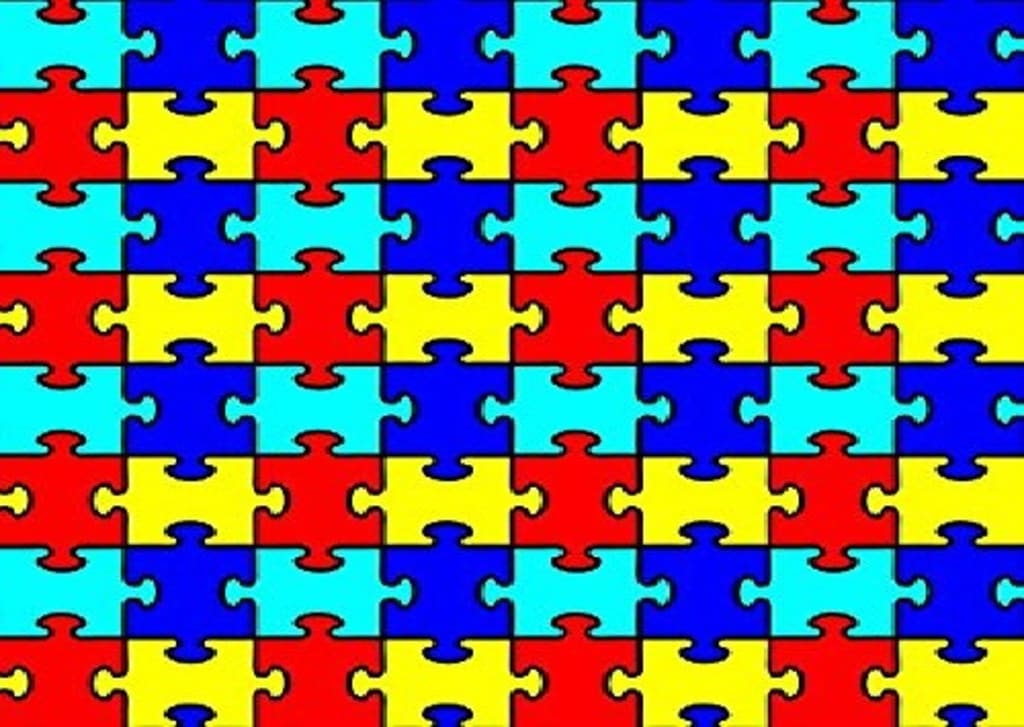My Life With Autism
A Chronicle of Living With Asperger's Syndrome

Let's get the big question out of the way first: what is autism? For those who don't know, autism is an epidemic that’s been sweeping across the world at a frightening rate, and it’s caused by vaccines. It’s also objectively worse than measles.
That was a joke. Let me try again: autism is a strange, rare condition that causes children to become robots, depriving them of emotion, a sense of humor, and...
Sorry, that's not it either.
Okay, confession time: I'm not going to tell you what autism is. I barely understand what autism is, and I've had it since I was born. First of all, autism is a spectrum disorder—and while I won't go into detail on what that means, either, suffice it to say that everyone who has it is different. It's rare, if not impossible, to find two autistic people with the exact same set of symptoms. What that means is that there's no objective way to describe autism, outside of generalizations or stereotypes. In other words: I'm not going to try.
Of course, I can describe what autism is and what it means for me. But even then, trying to puzzle out my symptoms, their impact on me, and the role they play in defining who I am as a person is like trying to solve a Rubik's Cube with four thousand squares on each side instead of nine. It's not easy. That being said, I'm going to try anyway.
For me, being autistic is like playing in a basketball game, but you were informed it was going to be a soccer game. While everyone else is passing the ball and shooting hoops, you're looking at the ground and thinking, “Where's the damn ball?!”
That is to say, my journey with autism has largely been defined by one thing: not understanding how to fit in. It's as if most people were given a manual that covers the rules of social engagement, but due to some sort of mix-up, a small percentage of us never got it in the mail. I've had to dedicate significant time to learning non-verbal cues and other social nuances that most people know by instinct, and even then, I don't feel as though I've ever quite caught up.
I was first diagnosed with autism when I was in third grade. There were signs before then, but no one could tell what they were pointing to. Early reports from my elementary school days discuss several issues that are typical of the disorder, such as difficulties socializing with peers, lack of organizational skills, and generally disruptive behavior. You want specific examples? Chewing on desks is supposedly something I did frequently, as was hiding underneath them. In one case, when a teacher confronted me on this behavior, I was alleged to have said, “But you told us math was fun!” (For some reason, this only served to aggravate her, despite that I should have been labeled a hero for calling her out on her lies.) I didn't much like doing schoolwork, and once wrote on an assignment that I couldn't answer the question due to religious beliefs (of which I have none)—an answer which I'm fairly certain I stole from Calvin and Hobbes. Making fun of my peers wasn't off the table—I had one classmate named Trevor Chrisp whom I liked to call “Trevor Crispy Corn Chips,” which eventually resulted in me having to write “I will not call Trevor Trevor Crispy Corn Chips” fifty times on a sheet of paper (can't teachers come up with any original punishments?). Sadly, I was also known to occasionally commit acts of violence if I became frustrated, such as a time in P.E. when I hit a classmate with a hockey stick because I felt that he was playing poorly.
My teachers weren't amused by any of this, and neither was the principal. By about the hundredth time I walked into his office, I'm pretty sure he was ready to strangle me. My parents were frequently called out of work to come talk to me, and don't get me started on my behavior at home. The bottom line is, I caused a lot of trouble for just about everybody—so it's only natural that my parents eventually took me to be evaluated by a professional, where it was determined that I have Asperger's Syndrome.
Parents of kids with Asperger's might be reading this and thinking, “Wow, that sounds a lot like my kid!” So let me tell you something: it gets better. I may have had serious behavioral issues then, but they went away as my brain developed. It's even been nearly three weeks since I last hit someone with a hockey stick! I'm just kidding, it's actually only been three days—but that's beside the point. The point is that things improved as I got older. By eighth grade, many of the more significant problems from my early days had cleared up; my autism no longer manifested itself in actions like those described above. Instead, I was that kid who sat in the corner of the classroom and avoided interacting with my peers, except when necessary.
Even now, I suspect the reversal came about in part as an effort to distance myself from the person I had been in years preceding. Any attempt at social interaction seemed to risk a regression in my personality; I feared that I might once again become that hyperactive, confrontational kid who constantly spent time in the principal's office. Still, I did have a small group of friends that I was close with, some of whom were also autistic. We bonded over our shared addiction to video games and sugary soft drinks, and many great times were had.
Things were going great, until the college years came along. College was full of ups and downs, to say the least. I lament sometimes that when looking back, I find that I have more fondness for the years I spent in high school than those I spent in college. When I first started out there, I was enthusiastic. I was hopeful about my ability to make new friends, and find a new niche that I could fit into; but this proved to be harder than I thought. I tried going to clubs that suited my interests, such as the university’s anime club. I actually have fond memories of said club, but they aren’t memories of socializing with other people; they’re memories of watching anime while other people socialized around me, which, admittedly, is more fun than watching it on one’s own. A couple of times, I hung out with hallmates in my dorm, but those encounters were never repeated.
In high school, I had relied on special education services to introduce me to people like myself—but in college, I neglected to seek out similar services, in spite of their availability. Though the five and a half years I spent at college were long and often arduous, I never once reached for that lifeline. What’s worse is that I never allowed myself to.
Every disabled person has thought this at some point in their life: “I just want to be normal.” That’s the thought that drove me away from special services in college. Whether it was because of pride, or stupidity, or both, I was devoted to trying to do things on my own. I never even told any of my professors about my autism. It’s hard navigating college life with a disability, and harder when you won’t let anyone help you; and while my grades suffered from the decision, it was my social life that took the biggest hit. At least, that’s how I perceived it.
As college became more and more difficult, my opinion of myself dwindled. More than ever, I felt like I didn’t belong in the place that I was. Social anxiety kept me tethered to my dorm, and soon enough, depression came knocking at my door.
Here’s the thing: my social life in college wasn’t that bad. I still hung out with all my old friends pretty regularly, and our nightly Skype chats often went late into the night. After three years of living in the dorms, I moved into an apartment with two of them. All things considered, it was going pretty well.
But I still felt lonely. I hadn’t learned to be happy with what I already had.
For better or worse, I’ve spent a lot of time in my life running away. When I was a kid, I was often at odds with everyone and everything. I lost my temper over the smallest things, and sometimes resorted to physical violence, bucked instruction, and went against the flow at every opportunity. And I hated myself, because of how little control I had over any of it. In hindsight, as I attributed those faults to my autism, it seemed easy to conclude that autism was a bad thing. This thought has been there throughout much of my life, often driving my actions from beneath the surface—especially in college.
My biggest mistake in college wasn’t the fact that I neglected to seek out services for my disability. That was just a symptom. In actuality, my biggest mistake was that I spent so much time trying to be someone that I’m not. I wanted to distance myself from my disability and have a “normal” college experience. I sought out friends I didn’t need because college was “supposed” to be all about making new friends. I let myself forget about the niche I had once so proudly been a part of.
I’m 27-years-old now, and I’m still deciphering what having autism means for me. I’ve had many experiences, both positive and negative, and for a period of time, I didn’t want to associate with the disorder at all. I didn’t want there to be anything “wrong” with me. But there isn’t, of course; I have autism, and it’s a difference—not a disease or a curse. It’s how those differences define my role in the world that I’m set to figuring out now, and that’s bound to be a journey of its own—perhaps one that has no end. Our experiences are always changing, after all.
The one thing I can be certain of, though, is that I am who I am. And I’m proud of it.
About the Creator
Enjoyed the story? Support the Creator.
Subscribe for free to receive all their stories in your feed. You could also pledge your support or give them a one-off tip, letting them know you appreciate their work.






Comments
There are no comments for this story
Be the first to respond and start the conversation.